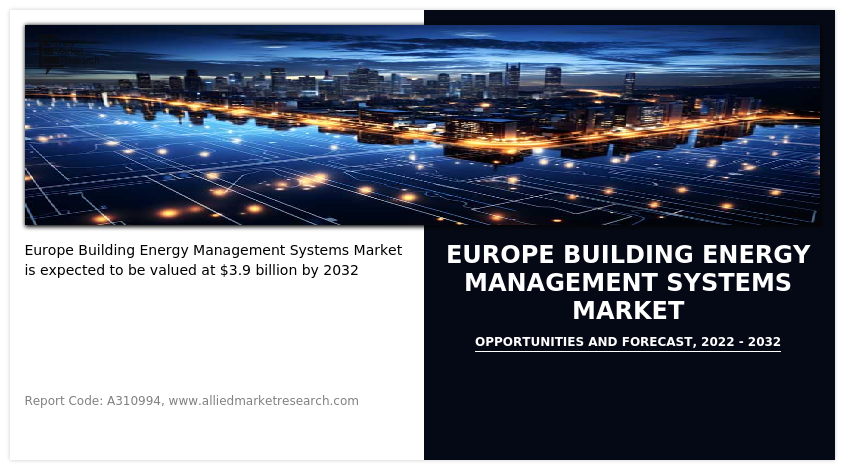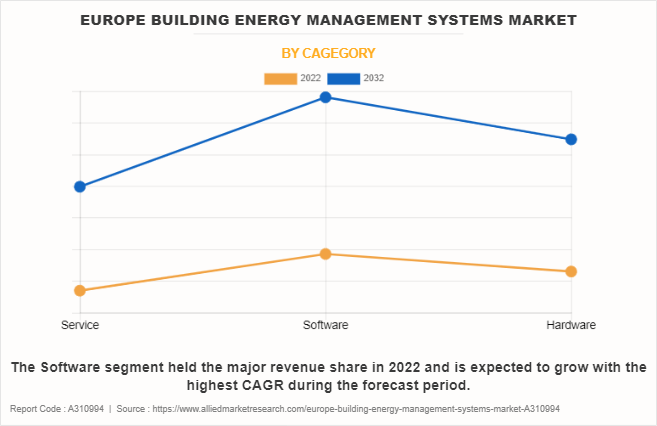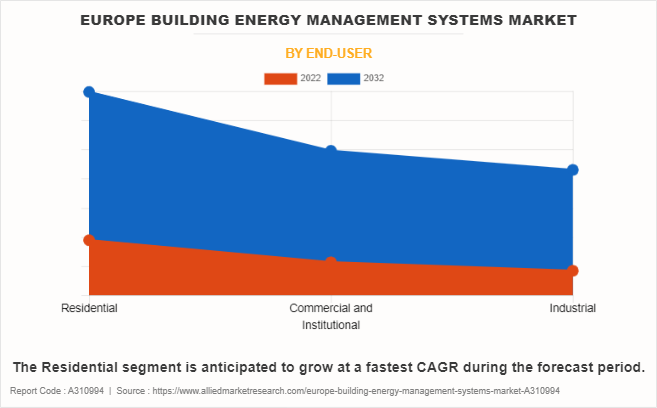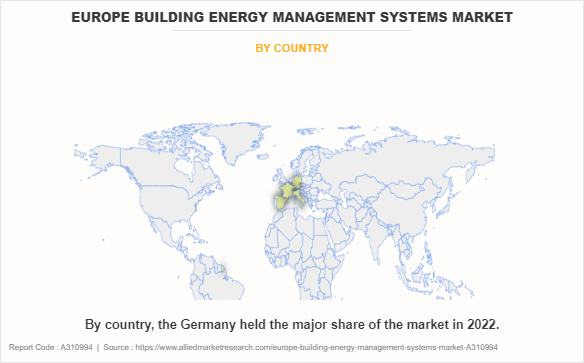The Europe Building Energy Management Systems Market is expected to reach a value of $3.9 billion by 2032 during the forecast period 2023-2032
Report Key Highlighters:
- The study integrated high-quality data, professional opinions and analysis, and critical independent perspectives. The research approach is intended to provide a balanced view of Europe building energy management system market and to assist stakeholders in making educated decisions in order to achieve their most ambitious growth objectives.
- Over 3,700 product literature, annual reports, industry statements, and other comparable materials from major industry participants were reviewed to gain a better understanding of the market.
- The Europe building energy management systems market share is highly fragmented, with several players including ABB Ltd, Automated Logic Corporation, Beckhoff Automation GmbH & Co. KG, Distech Controls, Johnson Controls International plc, Legrand SA, Sauter Controls, Schneider Electric, Siemens AG, and Trane Technologies plc. Also tracked key strategies such as acquisitions, product launches, mergers, expansion etc. of the players operating in the Europe building energy management systems industry.

Europe Building Energy Management System (BEMS) is a comprehensive system designed to monitor, control, and optimize building performance in terms of energy consumption. It integrates various technologies, including sensors, meters, and software, to provide real-time insights into a building's energy usage. The primary goal of BEMS is to enhance energy efficiency, reduce operational costs, and minimize environmental impact.
One of the fundamental components of BEMS is its ability to monitor energy consumption within a building. This involves the deployment of sensors and meters to track electricity, gas, and water usage. Real-time data from these sensors enable facility managers to identify patterns, anomalies, and areas of inefficiency. In Europe, where stringent energy efficiency regulations are in place, BEMS helps buildings comply with standards and achieve certification, such as the Building Research Establishment Environmental Assessment Method (BREEAM) certification, which is widely recognized in Europe.
The residential sector in Europe is experiencing a growing adoption of building energy management system (BEMS). Homeowners are leveraging smart home technologies integrated with BEMS to monitor and control energy consumption. This includes smart thermostats, energy-efficient lighting, and home automation systems. Governments in Europe often incentivize residential BEMS adoption through subsidies and rebates, further promoting sustainable practices at the individual level.
Public sector buildings, such as schools, hospitals, and government offices, in Europe, are integrating BEMS to optimize energy usage. These institutions benefit from the cost savings associated with efficient energy management, allowing them to allocate resources to critical services. Moreover, the public sector's commitment to sustainability aligns with broader European initiatives to combat climate change.
The integration of renewable energy sources is a key aspect of Europe building energy management system market. As the region seeks to transition to a low-carbon energy system, BEMS enables the effective incorporation of solar panels, wind turbines, and other renewable sources into the energy mix. This flexibility in energy sourcing contributes to resilience and sustainability, aligning with the European Union's ambitious climate and energy targets.
The European Union's Horizon 2020 program has played a crucial role in funding research and innovation in the field of BEMS. This has led to the development of cutting-edge technologies and solutions, positioning Europe at the forefront of global advancements in building energy management. The collaboration between industry, academia, and policymakers under programs like Horizon 2020 has accelerated the adoption of innovative BEMS technologies across Europe.
The UK has been a leader in implementing energy efficiency measures, and BEMS plays a crucial role in achieving these objectives. The UK government has introduced various initiatives, such as the Minimum Energy Efficiency Standards (MEES), which encourage the use of BEMS to enhance building performance. The Building Research Establishment (BRE) in the UK provides certification for BEMS, contributing to the standardization of these systems.
France has a growing emphasis on sustainable building practices, and BEMS are gaining popularity as tools to achieve energy efficiency goals. The French government has implemented regulations like the Grenelle Environmental Round Table, which promotes sustainable construction and renovation practices. BEMS contributes to meeting the stringent energy performance requirements set by these regulations.
In Southern European countries such as Spain and Italy, energy demand is high, there is a growing recognition of the importance of BEMS in managing and optimizing energy consumption. BEMS are utilized to control HVAC systems, lighting, and other building systems to ensure efficient operation. The adoption of BEMS aligns with efforts to reduce energy costs and adhere to European Union directives on energy efficiency.
Technological Advancements In The Internet of Things (IoT) And Smart Sensors Drive The Growth Of Europe Building Energy Management System Market
Building Energy Management Systems (BEMS) have undergone significant technological advancements in recent years, with innovations such as the Internet of Things (IoT) and smart sensors playing a pivotal role in transforming the capabilities of these systems. These advancements have made BEMS more attractive and also highly effective in optimizing energy consumption, improving sustainability, and enhancing overall building management.
Smart sensors play a pivotal role in the evolution of BEMS in Europe. These sensors are capable of capturing and transmitting detailed information about the building environment, offering unprecedented insights into energy usage patterns. In terms of building management, smart sensors contribute to enhanced efficiency in several ways.
In September 2022, the European Commission introduced the Cyber Resilience Act, aimed at enhancing the security of IoT devices in Europe. This legislation establishes minimum security standards for connected devices from their development phase throughout their entire life cycle in buildings. Manufacturers are held accountable for ensuring the digital security of their products, and the Act also includes provisions to provide consumers with additional information regarding the security of their gadgets.
Limited awareness in small and medium-sized enterprises is expected to restraint the market. In Europe, the adoption of Building Energy Management Systems (BEMS) faces a notable constraint linked to the limited awareness among Small and Medium-sized Enterprises (SMEs). SMEs constitute a substantial portion of the business landscape in Europe, encompassing diverse sectors such as manufacturing, services, and retail. One primary challenge is the lack of targeted outreach and education initiatives tailored specifically for SMEs. Unlike larger corporations that may have dedicated resources for exploring and implementing energy management solutions, SMEs often operate with leaner budgets and may not prioritize investments in technologies such as BEMS.
The Europe building energy management systems market is segmented into category, end-use industry, and region. On the basis of category, the market is classified into service, software, and hardware. On the basis of the end-use industry, the market is divided into residential, commercial & institutional, and industrial. In Europe the market is studied across Germany, the UK, France, Italy, Spain, and rest of Europe.

On the basis of category software segment dominated the Europe building energy management systems market in 2022. The software component of BEMS is integral for collecting, analyzing, and visualizing data to make informed decisions about energy consumption. Integration with Building Management Systems (BMS) allows for centralized control and real-time monitoring. This software can range from cloud-based platforms to on-premises solutions, providing flexibility based on user preferences and organizational requirements.

Based on end-use industry residential segment Europe dominated the building energy management systems market in 2022. Reduced energy consumption translates to a smaller carbon footprint, contributing to environmental sustainability. BEMS help mitigate the environmental impact of residential buildings by promoting energy-efficient practices. Smart algorithms within these systems can automatically adjust settings such as heating, ventilation, and lighting to capitalize on periods of lower energy costs.

By Country Germany dominated the Europe building energy management system market in 2022. Germany has been a key player in the Europe building energy management system market, driven by its focus on energy efficiency and sustainable building practices. The country's stringent regulations and emphasis on green building standards contribute to the adoption of advanced BEMS solutions.
The major players operating in the Europe building energy management systems market analysis ABB Ltd, Automated Logic Corporation, Beckhoff Automation GmbH & Co. KG, Distech Controls, Johnson Controls International plc, Legrand SA, Sauter Controls, Schneider Electric, Siemens AG, and Trane Technologies plc.
Historic Trends Of Europe Building Energy Management System Market
- In the 1980s the integration of microprocessor technology led to more advanced building energy management systems (BEMS) in Europe. Governments in various European countries started promoting energy efficiency measures, encouraging the adoption of BEMS to optimize building performance.
- In the 2000s European countries, recognizing the importance of reducing carbon emissions, began implementing regulations and standards encouraging the use of BEMS for energy management in buildings. Advances in communication protocols and control systems contributed to the growth of BEMS adoption in Europe.
- In the 2010s the adoption of cloud computing, IoT, and smart building technologies gained momentum in Europe, enhancing the capabilities of BEMS. European countries continued to strengthen regulations and standards related to energy efficiency, driving the demand for more sophisticated BEMS solutions.
CXO Perspective
According to the opinions of various CXOs of leading companies, the Europe building energy management system market was dominated by the software segment. Renewable energy integration is another significant aspect of BEMS in European residential settings. With the increasing popularity of solar panels and other renewable energy sources, BEMS facilitates the seamless integration of these systems into the overall energy management strategy. Homeowners can monitor the performance of their renewable energy installations and ensure that excess energy is stored or fed back into the grid.
Technological advancements in the Internet of Things (IoT) and smart sensors drives the growth of Europe building energy management systems market. The integration of IoT in BEMS allows for the seamless communication and coordination of various devices and systems within buildings. Smart sensors play a crucial role by collecting real-time data on energy consumption, occupancy patterns, and environmental conditions.
However, data security concerns expected to restraint the market. Data security is a paramount concern in Building Energy Management Systems (BEMS), given the inherent involvement in the collection and analysis of sensitive information. The challenge lies in establishing and maintaining robust cybersecurity measures to safeguard the integrity and confidentiality of the data involved. The complexity of BEMS infrastructure adds to the challenge of ensuring a secure environment.
Key Benefits For Stakeholders
- The report provides a comprehensive analysis of the current market estimations through 2022-2032, which would enable the stakeholders to capitalize on prevailing Europe building energy management systems market statistics.
- Major countries are mapped according to their revenue contribution to the europe building energy management systems market.
- In-depth analysis of the Europe building energy management systems market forecast to assists to determine the prevailing market opportunities.
- Identify key players and their strategic moves in Europe building energy management systems market trends.
- Assess and rank the top factors that are expected to affect Europe building energy management systems market growth.
- Analyze the market factors in various countries and understand Europe building energy management systems market opportunities.
- Player positioning provides a clear understanding of the present position of key market players.
Europe Building Energy Management Systems Market Report Highlights
| Aspects | Details |
| Forecast period | 2022 - 2032 |
| Report Pages | 120 |
| By Cagegory |
|
| By End-User |
|
| By Country |
|
| Key Market Players | Eaton Corporation, Schneider Electric SE, Honeywell International Inc., Siemens AG, Johnson Controls International plc, Legrand Group, ABB Ltd., Schneider Electric, Emerson Electric Co., Mitsubishi Electric Corporation |
The Europe Building Energy Management Systems Market is estimated to reach $3.9 billion by 2032.
Schneider Electric, Siemens AG, Honeywell International Inc., Johnson Controls International plc, ABB Ltd., Eaton Corporation, Legrand Group, Emerson Electric Co., Mitsubishi Electric Corporation, Schneider Electric SE are the leading players in Europe Building Energy Management Systems Market
1. The report provides a comprehensive analysis of the current market estimations through 2022-2032, which would enable the stakeholders to capitalize on prevailing market opportunities.
2. Major countries are mapped according to their revenue contribution to the europe building energy management systems market.
3. In-depth analysis of the europe building energy management systems market segmentation assists to determine the prevailing market opportunities.
4. Identify key players and their strategic moves in europe building energy management systems market.
5. Assess and rank the top factors that are expected to affect the growth of europe building energy management systems market.
6. Analyze the market factors in various countries and understand business opportunities. 7. Player positioning provides a clear understanding of the present position of key market players.
Europe Building Energy Management Systems Market is classified as by cagegory, by end-user
Loading Table Of Content...
Loading Research Methodology...



